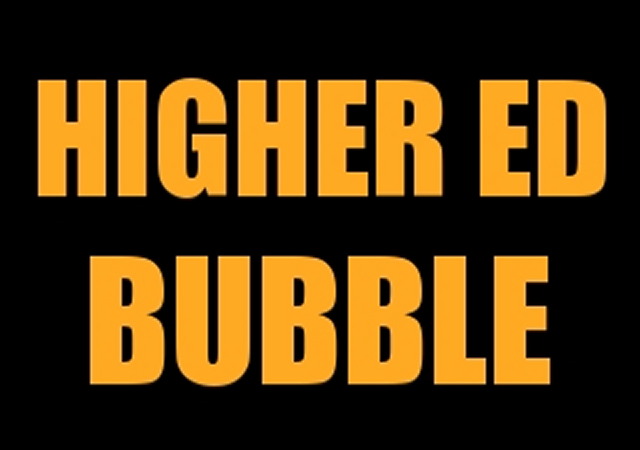Another Survey Highlights Americans’ Doubts About Higher Education
“Growing dissatisfaction with higher education has been a common concern in recent years”

This is a recurring theme. People see the ridiculous price tags for tuition but not the benefits.
This is from the Chronicle of Higher Education:
What the Public Really Thinks About Higher Education
Americans today believe in the value of a college credential, but they aren’t convinced higher education is fulfilling its promise to society.
That ambivalence toward colleges — general support with some real caveats — infused responses to a national poll by The Chronicle to gauge public perceptions of higher education. The goal was to probe attitudes about the value of a degree and, beyond educating individual students, institutions’ broader activities and goals. This is the first of several stories that will explore the poll’s findings and the issues they raise.
Most people, whether they have a four-year degree or not, would advise others to pursue one, our poll found. Yet many don’t think institutions do a great job educating their students — or that they are of great benefit to graduates. Alternatives like trade school strike many Americans as just as good of a path to a successful livelihood. And colleges’ value to communities and to society also draws skepticism.
Growing dissatisfaction with higher education has been a common concern in recent years, as some polls sound a drumbeat of doom — that confidence is falling, that institutions are moving in the wrong direction, that more people think they have a negative effect on the nation.
At the same time, conservative politicians have heightened attacks on colleges, claiming that institutions further progressive agendas and indoctrinate students. Many Democrats still voice support for higher education, though often with demands to improve graduation rates and limit student debt.
Caught in the middle, college leaders are under pressure to defend their institutions’ value, and often argue that wide access to higher education is essential to the nation’s civic and economic fortunes.
Donations tax deductible
to the full extent allowed by law.








Comments
Why Are You Still Sending Your Kids to School? The case for helping them leave, chart their own paths, and prepare for adulthood
Author: Blake Boles
Year: 2020
The Case Against Education: Why the Education System Is a Waste of Time and Money
Author: Bryan Caplan
Year: 2018
The Teenage Liberation Handbook (Third Edition): How to Quit School and Get a Real Life and Education
Author: Grace Llewelyn
Year: 2021
Inside American Education: The Decline, The Deception, The Dogmas
Author: Thomas Sowell
Year: 1992
There was a good, data-supported article on this in the last NYT Magazine (I know, not popular around these parts): https://www.nytimes.com/2023/09/05/magazine/college-worth-price.html?searchResultPosition=3
Boiled down, while the wage advantage of going to college (about +65% over non-college) has remained stable, the higher cost of going to college, especially when paid with loans, has just about negated it.
This is especially true for “life of the mind”-type majors like philosophy and English, where there may now be a negative ROI if one goes to a private university for such a degree. For STEM and Business majors, the ROI remains positive but diminished.
What can’t go on forever won’t, as a smarter man than me once said.
Lololol Ok emperor and yes your new clothes are very, very stylish lololol
What stuff and nonsense!
It’s 2023! Look around!!! No historical analysis cherry-picked by the hired propagandists at nytimes can , by definition, account for the seismic changes occurring in America’s economy and culture today.
With very few exceptions, in 2023 no sane American family should allow permit themselves to fall prey to the hype that is the American college/university system.
Don’t believe me? No problem. Try this experiment: Take a year and learn a second language. Then, reassess where you’re at. Trust me, you’ll realize right quick just how truly irrelevant almost everything about America’s higher education system has become, in today’s world.
Sooner or later, even the slowest (thinking) American will tumble to the truth of the unified theory: if you make a government service out of something, it will be poisoned politically. Schools. Libraries. Health. Banking. Charity. Retirement.
Unfortunately, the unified theory equally applies to areas that form the valid rationales for governments at all: Defense, Justice, and Civil (Contract) Law.
The overall theory behind government formation is the hope that by consenting to be shorn, we can avoid becoming mutton. Every 50 years or so, one country or another provides proof that this is never more than a very short-term guarantee.
Our founders were wise in giving the federal government absolutely no delegated authority at all to any of the issues in the first paragraph. Hungry men arrogated that authority, as they always have and they always will, no matter what protections people write down on a piece of paper. The only ultimate protection against this was the Second Amendment, which we are continually warned, as good people, never to use until it is much too late to be effective.